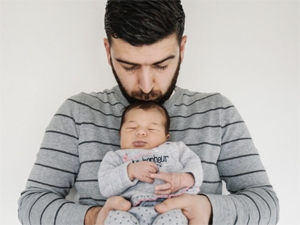
A growing number of young men are struggling with depression around the time of the birth of their first child. Many first-time dads would rather stifle their feelings than talk about them, making the home situation more heated and fraught, and their sense of helplessness exacerbated.
With no socially acceptable forum where they might share and explore some of these feelings, male postpartum depression is easily eclipsed by its maternal counterpart, and often missed altogether. The following is abridged and edited from an article that appeared in Parents Magazine.
A 2014 study published in Pediatrics found that depression among new dads increases by 68 percent during the first five years of baby’s life — which amounts to 3,000 dads who become depressed daily.
Author of Dying to Be Men (Routledge, 2011) and founder of Postpartummen.com, Dr. Will Courtenay writes that several factors contribute to depression that seems to peak in the 3-6 month period after birth:
- neurochemical changes in the brain as a result of sleep deprivation;
- a dad’s rocky relationship with his partner;
- financial problems or stress;
- a sick, colicky, or premature baby;
- In addition, men who have experienced the loss of loved ones — either in the adult years prior to becoming a parent or while growing up — are also at increased risk for depression.
The best predictor of a man’s risk of depression is whether his wife is also depressed. “Half of all men whose partners have postpartum depression are depressed themselves,” says Courtenay. “Depression in both parents can result in devastating consequences for their relationship and especially for their children,” if not addressed.
Additional factors may play into the equation. Because depression makes it difficult to engage fully and joyfully with the new family, many men feel intense guilt for being “bad dads.” Others feel inadequate in meeting the expectations and performing the child-caring tasks as skillfully and intuitively as the child’s mother. And finally, there may be unconscious or unexpressed grief at having seemingly lost their place as the center of their partners’ attention and affection (a situation that is exacerbated, naturally, if the mother, too, is struggling emotionally and feeling overwhelmed by the new reality).
Experts believe that paternal postpartum depression may be more prevalent now, largely because this generation of fathers is feeling the same psychological, social, and economic stressors that many mothers have long experienced. With more moms working, dads are shouldering child care and household tasks that traditionally fell to women.
Unlike “the blues,” untreated depression can worsen. While some men exhibit classic symptoms of sadness, others become irritable, agitated or angry. Dads may have shortness of breath, heart palpitations, or full-blown panic attacks. It is not uncommon for postpartum men to feel worthless; to lose interest in sex or activities that used to bring them joy; or to engage in such risky behaviors as abusing alcohol or drugs, gambling or extramarital affairs.
“Guys who suddenly start working 60 hours a week may also be depressed, since immersing themselves in their job is the way many men cope with stress,” adds Dr. Courtenay.
The symptoms and behaviors described above warrant treatment. Research shows that talk therapy is very effective in treating depression, and is sometimes combined with medication. Also helpful are support groups and websites like Postpartummen.com, which provide facts about male postpartum depression and act as an online forum where men can share their feelings anonymously.
Getting help can save a man’s life — or his marriage. And if a father can’t do it for himself, he should get help for the well-being of his child. For a man to admit he is depressed is neither unmanly nor an admission of defeat. It’s a way to take charge of his life.